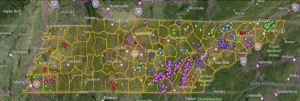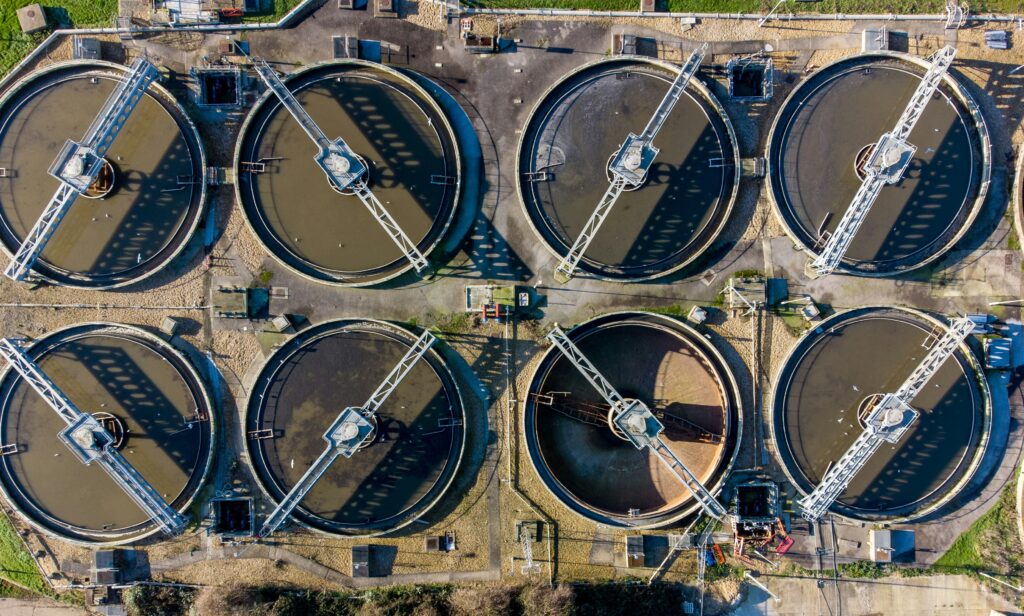Publication Date
August 14, 2024
The Tennessee Department of Environment and Conservation is holding a public hearing on Sept. 5 at 1 p.m. to discuss the permit that authorizes land application of biosolids.
Recent findings highlight the presence of PFAS, also known as "forever chemicals," in biosolids across Tennessee. These chemicals, often found in treated sewage sludge used as fertilizer, pose risks to our water resources and soils.
At Aries Clean Technologies, we recognize the critical need for sustainable solutions to manage biosolids. Our advanced gasification technology is designed to eliminate harmful PFAS, protecting our soil and water while contributing to a cleaner, safer future for all. 🌍♻️
By Caroline Eggers
Farmers, landowners and government agencies have been using treated sewage to fertilize land in Tennessee for decades, but the practice is being increasingly scrutinized: Sewage sludge can be contaminated with toxic chemical compounds known as PFAS.
The latest evidence comes from northeastern Tennessee.
Earlier this year, the Sierra Club tested soil, groundwater and drinking water in Sullivan County near historic or current usage sites of sewage sludge, also called “biosolids,” and found PFAS at each location, according to a new report.
“It’s a complicated problem,” said Dan Firth, a waste expert for the Sierra Club’s Tennessee Chapter and author of the report. “An immediate thing we can do is stop applying the biosolids now.”
How sewage can lead to PFAS-contaminated drinking water
After sewage or industrial discharge swirls down pipes, it ends up in wastewater treatment plants. These plants will treat the waste, and the solid leftovers may be turned into biosolids and distributed as fertilizers. Many farmers and landowners spread this product across their fields: In the U.S., about 60% of biosolids are used on land as fertilizers.
Facilities test for pathogens and heavy metals, like lead, but most states do not test sludge for PFAS, which can come from industrial waste or even toilet paper.
When landowners spread sludge, PFAS can wash off fields into nearby rivers, leach into the groundwater, be absorbed by plants and pollute local drinking water.
“As we’re continuing to apply these contaminated biosolids to the land, we’re putting our water resources at risk in addition to the land,” Firth said. “PFAS flows into the water.”
And these pollutants can contaminate resources far from the original application sites.
PFAS are linked to cancer, reproductive issues
PFAS, or per- and polyfluoroalkyl substances, are a class of about 15,000 synthetic chemical compounds placed in numerous industrial and consumer products, ranging from dental floss and lipstick to ink and waterproof apparel. The compounds do not break down or degrade once present in the environment, accumulating in soil, water, animals and people. PFAS, often nicknamed “forever chemicals,” are linked to many health problems, including some cancers and reproductive issues.
The Sierra Club collected soil and water samples in Sullivan County from a field where sludge was applied historically, a field adjacent to a field where sludge is currently being applied, and a drinking water well near fields where sludge is applied. The wastewater treatment plant in Bristol, Tenn. and Bristol, Va. produces sludge with local sewage and discharges from two local landfills, and this sludge is being spread in eastern Sullivan County.
PFAS were detected at each site tested, according to the report.
But this is just one example.
“Biosolids are being applied across the state,” Firth said.

The map reflects locations where “Class B” biosolids are applied to farms and open lands in Tennessee. “Class A” biosolids can be applied anywhere and are not tracked.
Locally, Metro Water Services in Nashville manufactures a fertilizer called “Music City Gold” from its wastewater treatment plant. In 2022, the Sierra Club detected PFAS in this product, which meets EPA’s current requirements for a “Class A” biosolid and is being sold as a home fertilizer to Nashville residents. (Only “Class B” biosolid use is tracked.)
PFAS levels in Tennessee may be higher than early tests show
This type of testing only reveals part of the problem. Typical testing methods scan for 40 PFAS compounds, Firth said, among the now-estimated 15,000 compounds. To fill in some gaps in the latest round of sampling, the Sierra Club examined the total organic fluorine to better reflect total PFAS levels.
“By comparing the fluorine that arises from the measured PFAS compounds and comparing it to the total, we get an idea of how much PFAS we are not measuring,” Firth said.
The fluorine analysis indicated that the untargeted PFAS compounds are potentially hundreds to thousands of times higher than the detected concentrations.
“We do know that they are there and that many of them will break down into toxic compounds and leach into the soil, the groundwater and surface waters,” Firth added.
Some states are banning biosolid use on land
Maine banned sewage sludge as a fertilizer in 2022, citing PFAS concerns. Connecticut became the second state to do so this year with legislation that also phases out products with “intentionally added” PFAS, like firefighting gear and menstruation products.
Maine is the only state that has systematically tested farmland for PFAS, which samples show has contaminated more than 70 farms and disrupted people’s livelihoods — sometimes from sludge that was spread decades earlier.
Firth said companies need to stop using PFAS, but, until then, Tennessee should also ban sewage sludge as a fertilizer.
The Tennessee Department of Environment and Conservation is holding a public hearing on Sept. 5 at 1 p.m. to discuss the permit that authorizes land application of biosolids. Any member of the public can email written comments to John Newberry at john.newberry@tn.gov until Sept. 20.
Original Link: https://wpln.org/post/pfas-contaminated-sewage-sludge-is-spreading-across-tennessee-lands-the-state-might-intervene/




